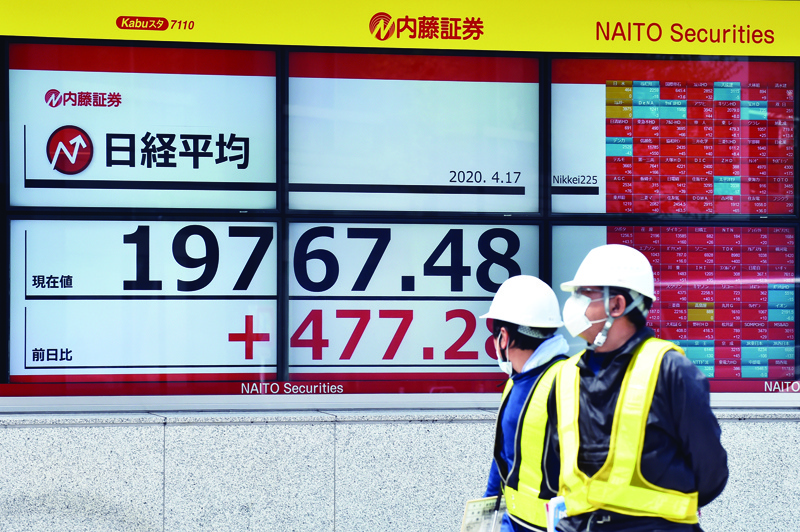
HONG KONG: Oil prices collapsed to more than two-decade lows yesterday as traders grow concerned that storage facilities are reaching their limits, while signs that the coronavirus may have peaked in Europe and the United States were unable to help Asian equities extend their recent advances.
US crude benchmark West Texas Intermediate briefly plunged almost 20 percent to below $14.50 -- its lowest since 1999 -- as stockpiles continue to build owing to a crash in demand caused by the COVID-19 pandemic. Analysts said this month's agreement between top producers to slash output by 10 million barrels a day was having little impact on the oil crisis because of lockdowns and travel restrictions that are keeping billions of people at home.
WTI was hit particularly hard as its main US storage facilities in Cushing, Oklahoma, were filling up, with Trifecta Consultants analyst Sukrit Vijayakar saying refineries were not processing crude fast enough. There are also plenty of supplies from the Middle East with no buyers as "freight costs are high", he told AFP. "I think we will see a test of the 1998 lows at $11 sooner rather than later," OANDA senior market analyst Jeffrey Halley told AFP. And AxiCorp's Stephen Innes added: "It's a dump at all cost as no one… wants delivery of oil, with Cushing storage facilities filling by the minute.
"It hasn't taken long for the market to recognize that the OPEC+ deal will not, in its present form, be enough to balance oil markets." Stock markets were mostly lower despite governments starting to consider how and when to ease lockdowns that have crippled the global economy. Italy, Spain, France and Britain reported drops in daily death tolls and slowing infection rates, while Germany began allowing some shops to reopen and Norway restarted nurseries.
'No time to get cocky'
"We are scoring points against the epidemic," said French Prime Minister Edouard Philippe, but he insisted "we are not out of the health crisis yet". Meanwhile, in the US, Andrew Cuomo, governor of badly hit New York state, said the disease was "on the descent", though he cautioned it was "no time to get cocky".
Mounting evidence suggests that the lockdowns and social distancing are slowing the spread of the virus. That has intensified planning in many countries to begin loosening curbs on movement and easing the crushing pressure on national economies. Caution gripped Asian share markets yesterday amid expectations a busy week of corporate earnings reports and economic data will drive home the damage done by the global virus lockdowns.
European stocks were headed for a strong start, however, with the pan-region EUROSTOXX 50 futures up 1.23 percent, German DAX futures gaining 1.26 percent and FTSE futures up 0.93 percent. E-Mini futures for the S&P 500 slipped 0.46 percent, having jumped last week on hopes some US states would soon start re-opening their economies.
Japan reported its exports fell almost 12 percent in March from a year earlier, with shipments to the United States down over 16 percent. Readings on April manufacturing globally are due on Thursday and are expected to hit recession-era lows. Better news came from New Zealand where success in containing the virus allowed the government to announce an easing in the country's strict lockdown from next week.
MSCI's broadest index of Asia-Pacific shares outside Japan eased 0.23 percent in slow trade, pausing after five straight weeks of gains. Japan's Nikkei fell 1.19 percent, but Chinese shares edged up 0.37 percent as a benchmark lending rate was lowered to shore up the coronavirus-hit Chinese economy after it contracted for the first time in decades.
US President Donald Trump said on Sunday that Republicans were "close" to getting a deal with Democrats on a support package for small business. The United States has by far the world's largest number of confirmed coronavirus cases, with more than 750,000 infections and over 40,500 deaths, according to a Reuters tally.
Shanghai, Mumbai and Bangkok rose while London, Paris and Frankfurt edged up in early trade. But most other markets were in retreat. Hong Kong was flat, while Tokyo fell more than one percent as Japan struggles to contain the disease, while Sydney shed 2.5 percent. Seoul dropped 0.8 percent and Manila dropped one percent. There were also losses in Taipei, Singapore, Wellington and Jakarta.
"The longer investors have to contemplate future economic issues while they wait for more countries to be on the downward slope of the pandemic curve, the more scope there is of risk assets pricing in a difficult future," Chris Iggo, of AXA Investment Managers UK, said. Investors are keeping an eye on Washington, where Congress and the White House are working towards a $450 billion economic relief plan for small business to add to the trillions already pledged to support the economy. Big-name companies including IBM, Netflix and Coca-Cola are due to deliver their earnings reports. - Agencies




